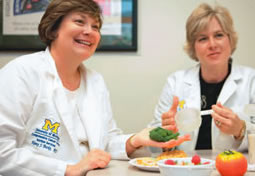You Ask and We Answer
Cancer Center Dietitians Answer Your Questions

By Joan Daniels, R.D., and Nancy Burke, R.D.
University of Michigan Rogel Cancer Center Dietitians
Dear Joan and Nancy:
- I've heard vitamin D can prevent cancer. But I've also heard that the best way to get vitamin D is through sun exposure. Won't that increase my risk of skin cancer? I almost never leave the house without sunscreen.
-A.R., Clawson, Mich.
Dear A.R.:
Oily fish, such as salmon, mackerel, tuna and sardines, are good sources of vitamin D along with milk and fortified cereals. Over-the-counter supplements are another way to increase vitamin D intake. But before you begin taking any supplement-including vitamin D -- it's important to talk with your health-care team to ensure that it is safe for you and will not interfere with any treatments you may be receiving.
Currently, the Food & Drug Administration recommends 400 IU per day of vitamin D for children; 200 IU for those 19 to 50 years old; 400 IU for those 51 to 70 years old; and 600 IU for those 71 and older. Researchers are working to better understand what the best dose of vitamin D is. However, people older than 50, those who get limited sun exposure and people with darker skin may be at more risk for vitamin D deficiency.
- You're doing the right thing: Limiting exposure to the sun is still the best course of action. Some studies have shown that vitamin D may be beneficial in preventing some types of cancer, including breast, prostate and colon cancers. However, there are other ways to increase your vitamin D intake besides sun exposure.
Dear Joan and Nancy:
- My husband always was a big eater, but now that he's undergoing treatment, he says he feels full after eating just a few bites. I'm worried he's not eating enough, but it makes him uncomfortable when he tries to eat more. Do you have any suggestions?
-E.K., Howell, Mich.
Dear E.K.:
Make sure your husband is eating foods that are rich in calories and nutrients. Eliminate fillers, like lettuce and broth. Also limit fluids at mealtime-especially sodas-as they can make you feel full. When you choose drinks, consider nutrient-dense fluids-such as milk, milkshakes or juices-and save them for between mealtimes.
Speaking of mealtimes, consider breaking the breakfast-lunch-dinner habit. Instead, make sure your husband has access to small amounts of food more frequently. Cut sandwiches into smaller pieces and save the leftovers for later. Keep ready-to-eat snack foods like dried fruits, nuts and granola bars on hand. Consider leaving them on the bedside table in case he feels like having a midnight snack.
If these suggestions don't work, consider a high-calorie nutritional supplement. Carnation Instant Breakfast makes a special-order drink that contains 560 calories. You can find it in the Rogel Cancer Center Pharmacy.
- Feeling full after eating a small amount of food is a common frustration for people undergoing cancer treatment. The key is to pack as many calories into those few bites as possible.
Continue reading the Summer, 2008 issue of Thrive.
